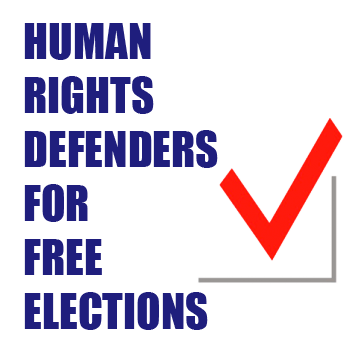Valiantsin Stefanovich: provisions of Electoral Code of Belarus prohibiting boycott are contrary to CIS Convention "On standards of democratic elections, electoral rights and freedoms"
In its report on the results of the observation of the first week of the presidential election campaign, the public election observation campaign "Human Rights Defenders for Free Elections" has already noted that the provisions of the Electoral Code that prohibit calling for a boycott of the elections are contrary to the Convention of the Commonwealth of Independent States "On Standards of Democratic Elections, Electoral Rights and Freedoms".
Due to the numerous discussions in the society of the country on the idea of boycotting the elections, I would like to focus solely on the legal side of the issue.
Case History
The idea of banning public calls to boycott the elections and bringing them beyond the pre-election campaign has appeared during the elections of deputies of the fifth convocation of the House of Representatives in September 2012
August 29, 2012 the Central Election Commission (CEC) issued its Resolution No. 93, answering the tactics of the election boycott, used by a number of opposition parties. According to this document, calls to boycott the elections were evacuated outside the election campaign. It should be noted that by issuing this ruling, which effectively banned public calls to boycott the elections, the Central Election Commission, in violation of its powers went beyond the norms of the then current version of the Electoral Code, Art. 45 and 47 in particular.
It should be recalled that this arbitrarily introduced practice resulted in numerous facts of detentions and arrests of citizens for publicly calling on voters to boycott the elections.
November 25, 2013, the Law of the Republic of Belarus № 72-3 came into force. According to this law, Articles 47 and 49 of the Electoral Code were amended, prohibiting public call for "disruption, cancellation or postponement of the elections". Such appeals were to be punished under Art. 9.10 of the Code of Administrative Offenses of the Republic of Belarus by a warning or a fine of to 15 basic units. It should be noted that with the adoption of the Electoral Code in 2000, administrative responsibility for public calls to boycott the elections on the polling day in Belarus was canceled. 13 years later it was restored.
Ratification of the CIS Convention on standards of democratic elections by Belarus. Legal consequences
The article could be finished here hadn't the members of the Chamber of Representatives, who had adopted the amendments to the Electoral Code and banned the calls for a boycott of the elections, also adopted the Law on ratification by Belarus of the Convention of the Convention of the CIS members states "On Standards of Democratic Elections, Electoral Rights and Freedoms", signed in Chisinau on October 7, 2002.
The peculiarity of the situation lies in the fact that para. 8 of Art. 6 of the Convention provides that citizens are free to exercise their electoral rights and freedoms, including in the form of boycott or appeals to boycott the election, refusal to comply with election procedures or election actions. Persons and bodies whose activities are directed to interfere with the free exercise by a citizen of his electoral rights and freedoms should be prosecuted.
It is no longer important whether the MPs had read the provisions of the Convention, for ratification where they voted unanimously. The fact remains – the provisions of the Electoral Code regarding the prohibition of public appeals to boycott the elections and responsibility for such appeals directly contradict the provisions of the ratified Convention, which is an international treaty.
Part 4 of Art. 6 of the Convention prohibits acts aimed at the postponement or disruption of elections and election procedures, and says nothing about the prohibition of calls to voluntary refusal of election procedures, unlike to Art. 49, part 1 of the Electoral Code. Citizens are entitled to exercise their voting rights, both through participation in the elections, and by refusing to participate in them (the principle of voluntary participation in the elections), as well as to call others to such actions, which is guaranteed by Art. 9, para. 8 of the Convention.
Thus, the Convention provides for the prohibition of actions that create obstacles or force voters to abandon the realization of their electoral rights (the blockade of the polling stations, destruction of election documents, creation of physical obstacles to coming to the polling stations, etc.).
As Belarus voluntarily assumed obligations to implement such an agreement, it requires the authorities of the country to bring the national legislation in line with the Convention. This is stated in Art. 8 of the Constitution of Belarus, under which Belarus recognizes the priority of universally recognized principles of international law and ensures the compliance of its laws with them.
Moreover, as provided by Art. 20 of the Law of the Republic of Belarus of January 10, 2000 № 361-3 "On normative legal acts of the Republic of Belarus", our country is not only recognizes the priority of universally accepted principles of international law and ensures compliance of the norms of the legislation of the Republic of Belarus, but also recognizes the standards contained in the international legislation as a part of the legislation that is in force on the territory of the Republic of Belarus and must be applied directly.
Thus, the citizens of our country have a right to freely exercise their voting rights, including in the form of a boycott of the elections and calls to boycott.
The activities of persons and entities on obstructing the free exercise of such rights, including through arrests, intimidation, providing other forms of oppression, would be contrary to the legislation in force and must entail liability under the law.


